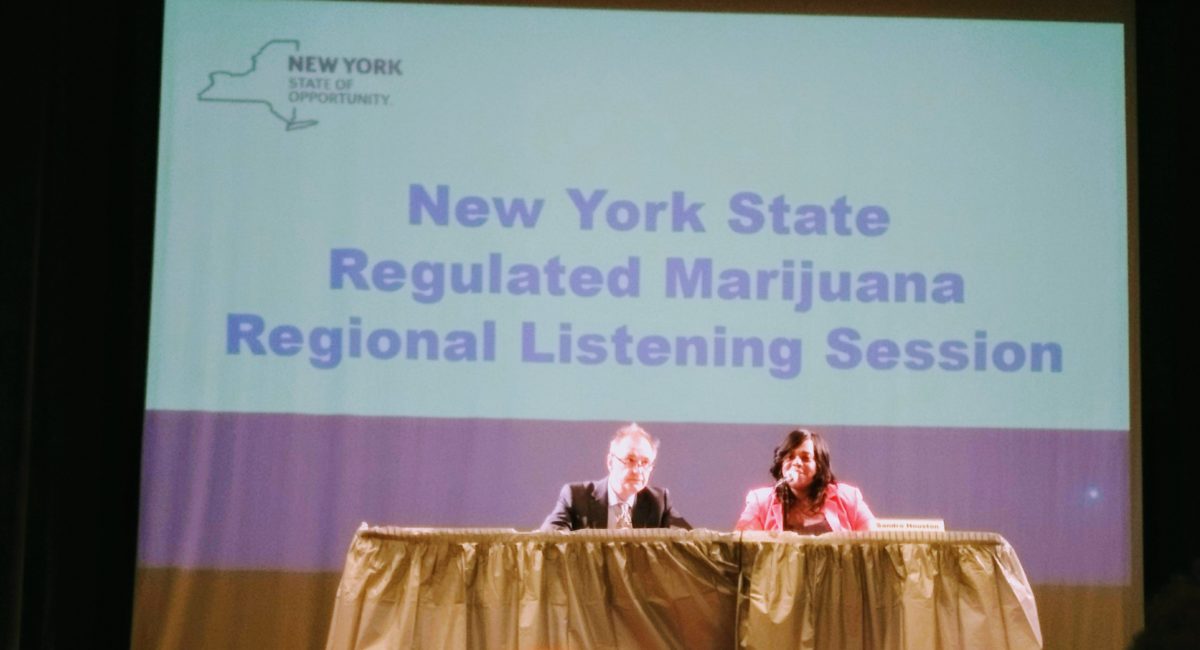The political season is upon us and if our call to register to vote wasn’t enough of a reminder, maybe this is: the New York state government is in the midst of hosting a bevy of listening sessions on legalizing cannabis across the Empire State.
So what’s at stake during these listening sessions? Well, it’s a little tricky. You may recall that earlier this year, Governor Cuomo’s office released an assessment report on the impact of a regulated cannabis market in New York. So, short-term, these are state-sanctioned events where policymakers and wonks in Albany want to gather intel and gauge the public’s interests, concerns, and questions on legalized cannabis within New York. Long-term? New York state, as we’ve covered, has been making more and more progress towards fully accepting cannabis. Whether it be in allowing canna-products to replace opioids as painkillers, or NYC mayor, Bill deBlasio, pushing for decriminalization of MJ on city streets, New York state has been quietly moving towards legalization for the majority of 2018.
With that in mind, the listening sessions are truly an important pathway for citizens to voice their opinions on how any future cannabis policy will be shaped, because let’s face it: the writing is on the wall with regards to legalization. But helping to form policy still counts and we heard a lot of varying, occasionally conflicting, opinions at a session that we recently attended in Queens, NY. Here are a few takeaways from our evening out in Jamaica:
The Cannabis Industry and States Should Be More Pro-Active With Education
From what we observed, New York state, and all of us within the plant-touching industry, need to do a more effective job of informing the public. A surprising amount of attendees from the pro and con sides of the debate, we’re under the impression that smoking cannabis flower was still the only way to utilize it. Clearly, from a medical and adult use standpoint, there are many other options at this point. Edibles, beverages, lotions, rendered products of all stripes, are becoming more and more popular methods of using cannabis for therapeutic or recreational use. While we saw some of the “I don’t want to have to inhale second-hand marijuana smoke and I don’t my infant to either,” [Neither do we, buddy. –Ed.] by and large, the concerns about smoking cannabis came from a lack of information and not antagonism.
Something else that needs to be better explained? The absolute necessity for compliance, licensing, lab testing, labeling and packaging; y’know, the infrastructural components that forge a legitimate industry out of a heretofore unregulated market. We were struck by the public’s lack of consideration for what the state of New York must understand about undertaking an initiative this large and complex in scope. New York state is taking its proper time and due diligence in learning what a legal cannabis industry could look like, and how it will work. As our own Aaron Lachant explained back in November of 2017 about California’s legalization efforts, “This is a monumental task. They are regulating an industry from the ground up and for the first time.” All of what Aaron said about California will ring true for New York (or any other state that legalizes.)
New York’s Clock Is Ticking
Another important issue facing New York legalization is how to dole out social equity programs. While everyone understands the noble utility of social equity, many in the crowd at the listening session were concerned about the fairness of social equity and how the money could be tracked and explicitly earmarked for neighborhoods and communities throughout the state that were most deserving of equity.
While New York state’s government is doing all they can to determine the best course of action with expediency and efficiency, the fact remains: New Jersey is still creeping ever closer to legalization. New York will not only stand to lose a fair amount of revenue if NJ beats them to the pot punch, but also could potentially be facing the unanticipated consequence of so many New Yorkers suddenly becoming traffickers if they’re busted crossing the Hudson from New Jersey back into New York state. Trafficking and, somehow even more concerning, driving under the influence of cannabis could become a real issue if residents of NY, particularly within the five boroughs, begin flooding into a legalized New Jersey market while New York stays “dry.”
New York should continue doing its homework and seek the best course of action for the state and her residents, but at the same time, as neighboring states such as Massachusetts, Connecticut, Vermont and New Jersey all push more lenient policies through their statehouses, New York state cannot be left at the starting line left to wonder what happened.

